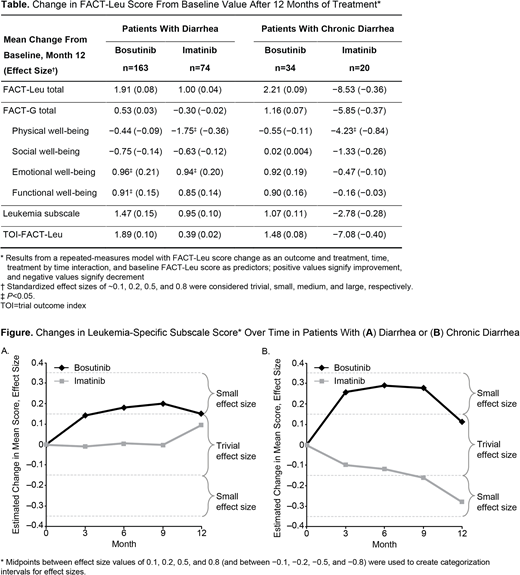Abstract
Introduction: In the ongoing phase 3 BFORE trial (NCT02130557), a significantly higher major molecular response rate at Month 12 was seen with bosutinib vs imatinib in patients with newly diagnosed chronic phase chronic myeloid leukemia (CP CML), and bosutinib treatment was accompanied by improvement or maintenance of health-related quality of life (HRQoL), as assessed by the patient-reported Functional Assessment of Cancer Therapy-Leukemia (FACT-Leu) instrument. Diarrhea is a common side effect of bosutinib and occurred more frequently in bosutinib- vs imatinib-treated patients in the primary analysis of the BFORE trial (all grades: 70.1% vs 33.6%). Here, the impact of diarrhea, specifically on HRQoL, was assessed in patients receiving bosutinib or imatinib in the BFORE trial.
Methods: Patients with CP CML were randomized 1:1 to receive first-line bosutinib or imatinib. HRQoL was analyzed in the modified intent-to-treat (mITT) population, comprised of Philadelphia chromosome-positive patients with typical BCR-ABL transcripts. The FACT-Leu consists of the 27-item FACT-General (FACT-G) scale with 4 domains (physical, social, emotional, and functional well-being) and the 17-item leukemia-specific subscale; higher scores and changes in scores indicate better HRQoL. Patients completed questionnaires at baseline, every 3 months for the first 2 years and every 6 months thereafter while on treatment, and at treatment completion. In this post hoc analysis, FACT-Leu scores from the first 12 months of treatment were analyzed in patients with diarrhea (any event during treatment) or chronic diarrhea (event lasting ≥28 days). Longitudinal analyses were conducted and standardized effect sizes were calculated to characterize the strength of effect on the FACT-Leu scores for the diarrhea and chronic diarrhea subgroups. Standardized effect sizes of approximately 0.1, 0.2, 0.5, and 0.8 (in absolute values) were considered trivial, small, medium, and large, respectively.
Results: In the mITT population (bosutinib: n=246; imatinib: n=241), 163 (66.3%) patients in the bosutinib arm and 74 (30.7%) in the imatinib arm had diarrhea and were evaluable for HRQoL; 34 (13.8%) and 20 (8.3%), respectively, had chronic diarrhea (≥28 days). Among patients who developed diarrhea, the FACT-Leu total score and most subscale scores improved from baseline to Month 12 in both treatment arms, although changes were generally not significant (P>0.05) and could be interpreted as small or trivial, based on effect size (Table). For patients with diarrhea in the bosutinib arm, changes from baseline in the leukemia-specific subscale could be characterized as small improvements starting at Month 6 of treatment; in the imatinib arm, an improvement was not seen until Month 12, and all changes could only be characterized as trivial (Figure). Among patients with chronic diarrhea, the changes from baseline at Month 12 were not significant for all FACT-Leu total or subscale scores in the bosutinib arm and could be interpreted as small or trivial; in the imatinib arm, changes from baseline in all FACT-Leu scores were numerically negative and nonsignificant with the exception of the physical well-being domain (P<0.01), which had a large effect size (Table). For patients with chronic diarrhea in the bosutinib arm, improvements in the leukemia-specific subscale at Month 3 through Month 9 could be characterized as small; in the imatinib arm, a deterioration was seen at Month 3 through Month 12, and changes could be considered small at Months 9 and 12 (Figure).
Conclusions: In this post hoc analysis of the BFORE trial, HRQoL was not negatively affected by diarrhea or chronic diarrhea in the bosutinib arm. Although the analysis is limited by the small number of patients, chronic diarrhea during treatment with imatinib appeared to have a greater impact on HRQoL than chronic diarrhea during treatment with bosutinib, based on the magnitude of the effect sizes and direction of changes, particularly for physical well-being. These data suggest that patients with CP CML treated with bosutinib can preserve or slightly improve HRQoL during therapy, regardless of the presence of diarrhea or chronic diarrhea.
Brümmendorf:Merck: Consultancy; Janssen: Consultancy; Novartis: Consultancy, Research Funding; Pfizer: Consultancy, Research Funding; Takeda: Consultancy. Mamolo:Pfizer: Employment, Equity Ownership. Reisman:Pfizer: Employment, Equity Ownership. Bushmakin:Pfizer: Employment, Equity Ownership. Cappelleri:Pfizer: Employment, Equity Ownership. Crescenzo:Pfizer: Employment. DeAnnuntis:Pfizer Inc: Employment, Equity Ownership. Viquiera:Pfizer: Employment, Equity Ownership. Cortes:Novartis: Consultancy, Research Funding; Daiichi Sankyo: Consultancy, Research Funding; Astellas Pharma: Consultancy, Research Funding; Pfizer: Consultancy, Research Funding; Arog: Research Funding.
Author notes
Asterisk with author names denotes non-ASH members.


This feature is available to Subscribers Only
Sign In or Create an Account Close Modal